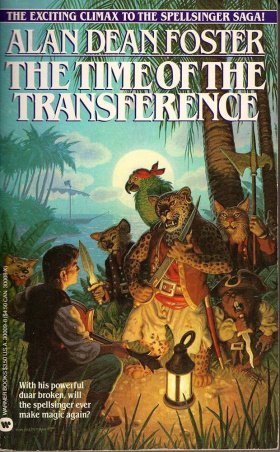Mudge raised a restraining paw. “Spare me the sappy ’omilies.”
Weegee whacked him in the ribs. “Like hell.” She smiled at Jon-Tom. “Go ahead. I love sappy homilies.”
“It’s just that I can’t imagine life without her.”
“That’s good. Go on,” she urged him, a contented expression on her face.
“I don’t know what to do.”
“No problem, I’m thinking.” Cautious poked at the fire. “You go get your instrument fixed, then we go back and get your lady, and lastly you both walk back through passage to your world.”
“It’s not that easy, Cautious. That’s what’s tearing me up. Talea’s never known any world but this one. Remember how you three reacted to mine? And we were in one of the simpler, easier to adapt to parts. In someplace like downtown Los Angeles you might’ve gone crazy. I don’t know if Talea could handle it.”
“Don’t underrate ’er, mate. She’s pretty tough, that redhead. I think she’d manage it.”
“I’m glad you think so, Mudge, because I’m not going back without her.”
“Right.” He hopped to his feet, pulled Weegee up after him. “Now that that’s settled, I’ve something to show you, luv.”
“Mudge, I’ve already seen that.”
“Not like this you ain’t.” Together they strolled off into the bushes.
Jon-Tom stared out over the silent lagoon. A cry of pain and surprise shattered the mood. Wordlessly, he and Cautious ran for their weapons, then turned and raced after the otters.
“What happened?” he asked breathlessly as they practically ran into Weegee. It was Mudge who answered. He was leaning againt a bush, holding his right foot.
“Tripped over this bleedin’ thing I did, but it don’t ’urt no more. No it don’t.”
Jon-Tom’s gaze dropped to the ground. What Mudge had stumbled over in the poor light was a medium-size cerulean blue Samsonite suitcase. A second case lay nearby, half buried in the sand.
“We didn’t see them earlier because they came through here in the weeds,” Weegee commented. “They must have been close enough to have traveled through on the same spellsong, Jon-Tom.”
“One of them was right next to my foot when I started singing in the truck.” He started to pick one up but Mudge beat him to it, began working on the locks.
The hundred pounds of cocaine was still inside, snug in its plasticine sacks.
Mudge danced gleefully around the suitcases.
“Mudge, we can’t keep this junk.”
The saraband ceased in mid-leap and the otter gaped at him in the moonlight. “Can’t keep it? Wot the ’ell are you sayin’, we can’t keep it? You want to haul it back through the cave so you can give it back to those two delightful blokes who were ready to sell us into slavery and kill you?”
“Of course not, but we can’t keep it. It’s too damn dangerous.”
“Oh matey-mine,” the otter moaned, “don’t you go all ethical on poor Mudge now. Not now o’ all times.” He picked up a bagful of white powder. “Do you know wot this ’ere stuff is worth? There’s them in places like Snarken an’ Polastrindu that would pay through the nose for a pinch of it, so to speak. Weegee and me, we wouldn’t ’ave to work another day in our lives.”
Jon-Tom was adamant. “I haven’t fought my way across this whole world and learned how to be a spellsinger so I could stoop to dealing drugs.”
“Fine! Let me stoop. I’m a ’ell of a stooper. I’m the best damn stooper you ever saw. It ain’t entirely your decision to make anyways. This ain’t no kingdom an’ you ain’t no bleedin’ emperor.”
“I know that.”
“The rest of us ’ave as much right to this booty as you do. We sure as ’ell ’ave gone through enough to earn it.”
“It’s not a question of who has the right, Mudge. It’s a question of what is right. The people of your world aren’t used to drugs of such potency.”
“’Ow the ’ell would you know? I could tell you stories.”
Jon-Tom tried a different tack. “Well, they’re not used to this type of drug.”
The otter let out a snort. “Stinger sweat is stinger sweat no matter wot world it comes from.”
“Mudge, it’s dangerous stuff. I don’t want any part of dealing it.”
“No problem, mate. I’ll take care o’ all of it.”
“Jon-Tom’s right, Mudge.”
The otter spun, stared at Weegee. “Wot do you mean ’e’s right, luv? ’E ain’t been right since ’e slid out o’ ’is mother’s womb, an’ I think ’e’s gettin’ less right every day.”
She gestured at the suitcases. “If he says it’s dangerous, I’m inclined to agree with him. After all, this comes from his world, not ours.”
“But luv,” Mudge pleaded, “don’t you see wot this could mean to us?”
“I think I do, yes. Mudge, I haven’t led the kind of life you have.” She looked apologetically at Jon-Tom. “Not every otter is an incurable hedonist like my sweet Mudge. Some of us do have higher aspirations and a semblance of morality.” She stared hard at her lover. “Do you know what we are going to do with this otherworldly poison, sweetness?”
Mudge turned away from her, in obvious pain. “Don’t say it, luv. Please don’t say it. Can’t we keep one packet?” She shook her head. “’Alf o’ one?”

























